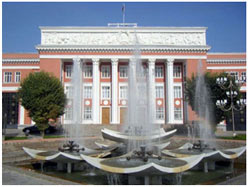Public Sector Advisory
Law and Public Administration
Many transition and emerging economies have lately engaged in a process to transform their public institutions. Globalization and the information revolution are motivating a large and growing number of countries around the globe to reexamine the roles of various levels of government and their partnership with the private sector and civil society. These reforms typically involve shifting responsibilities to local governments and beyond government providers with the objective of strengthening local governance.
We combine our knowledge and experience of the conditions for a well-functioning market economy with expertise in institutional support to assist governments in this process.
UNICON is helping promote good governance and effective institutions that are essential for equitable economic growth and social development. UNICON conducts in-depth analysis of these factors and develops programs that facilitate transparency, decentralization, legal reform, and civic participation.
UNICON manages a range of initiatives aimed at improving public sector management, strengthening law and justice, achieving greater efficiency in government services, and increasing private sector development.
Democratic governance is a key component in achieving the MDGs. An efficient, responsive, transparent and accountable public administration is a central part of democratic governance. It is also the basic means through which government strategies to achieve the MDGs can be
implemented. In developing countries, underdeveloped private sectors require the public administration to play a major role in the delivery of services and the provision of much needed economic infrastructure.
We address capacity development in the public administration at three levels: individual, institutional and societal. Our services in the public administration reform can be divided into four main areas:
- Civil service reform;
- Increasing the efficiency and responsiveness of the policy-making system;
- Reforming the machinery of government, which is concerned with the rules, institutions and structure of the administration necessary to carry out government policy, including new tools for public administration such as e-governance and e-government; and
- Reforming the public sector revenue and expenditure management system.
As mentioned earlier, sound legal frameworks are prerequisites for economic growth and social development. The process through which laws and regulations are conceptualized, drafted, enacted, publicized and enforced is the foundation of a society governed by the rule of law.
Legal reform is an ongoing and incremental process that involves the executive and legislative branches, law reform commissions, non-governmental organizations, and the public. In the legal reform, we help in addressing new international standards, responses to social and economic issues, expand access to justice and improve court operations.
Effective and coherent legal reform requires a comprehensive and sustainable approach that avoids importing "models" inconsistent with national legal and socioeconomic norms. Effective legal reform also promotes opportunity, security, and empowerment for the world's poor.
Although legal reform efforts often involve institutional restructuring, rewriting old laws and drafting new ones remains a necessary component of most legal reform projects. Moreover, many development projects that do not constitute legal reform per se, such as administrative reforms, infrastructure projects, environmental initiatives, nonetheless require changes in the substantive law. Sometimes, the governments may often find that their laws, often filled with last minute additions and deletions, conflict with one another or fail to serve the purposes intended.
Another component of the Rule of Law is a well-functioning justice system. That is why reforms of justice systems have become an important area of development cooperation. Though early legal reform efforts focused on changes to the substantive laws, it is now widely recognized that drafting new laws is by itself insufficient. Reform of the institutions that create, apply and enforce the law is also necessary.
Justice reform entails reform of a staggering array of institutions. Courts are obviously key, but the justice sector is also made up of ministries of justice, the legal profession, the police, prosecutors, public defenders, ombudsmen and others. The scope of justice reform also comprises all kinds of dispute resolution mechanisms. It includes those provided by the courts, but also alternative dispute resolution mechanisms.
The justice sector also relies on a number of legal professionals with various profiles. Judges, court staff, bailiffs, lawyers and notaries are all actors in the system. Consequently, justice reform deals with each of them, including the way they are educated and trained. These are the issues we
consider in implementing projects of this nature.
Aid management is our one more field of expertise. Increased aid allocations, a sharper focus on country priorities, and donor harmonization create unprecedented opportunities for more effective aid. UNICON provides a complete range of services to help aid agencies become more effective agents of development and change. This includes:
- Results-based Program Design;
- Performance Monitoring Systems;
- Participatory Development; and
- Donor Coordination.
Project on a Glance

Developing Methodologies, Procedures and Methods of the Competitive Selection for the Civil Service in Tajikistan
Development of a professional civil service in the Republic of Tajikistan is one of the priority objectives of the Public Administration System Reform Strategy, supported by the World Bank. Its successful implementation requires resolving the administrative tasks, developing and adopting normative legal basis, strengthening training system, retraining and increasing the qualification of civil service staff, technical equipping of the structures, and performing management function and coordination of the Civil Service of Tajikistan.
The consultant's tasks included analyzing the legal base and current practice of selection and recruitment for vacancies in the civil service; developing the Procedure and Selection Methods for Candidates Applying to Vacant Posts in the Civil Service; developing recommendations to improve the selection procedure, method and tools based on consideration of documents submitted by the Civil Service Department; preparing training materials to train the CSD staff and staff of HR departments of government bodies on application of the developed selection procedure, method and tools to assess candidates for vacant civil service posts; train the staff of the CSD and HR staff to develop specific selection tools (tests, questionnaires, etc.).
For more projects, visit Our Projects page









